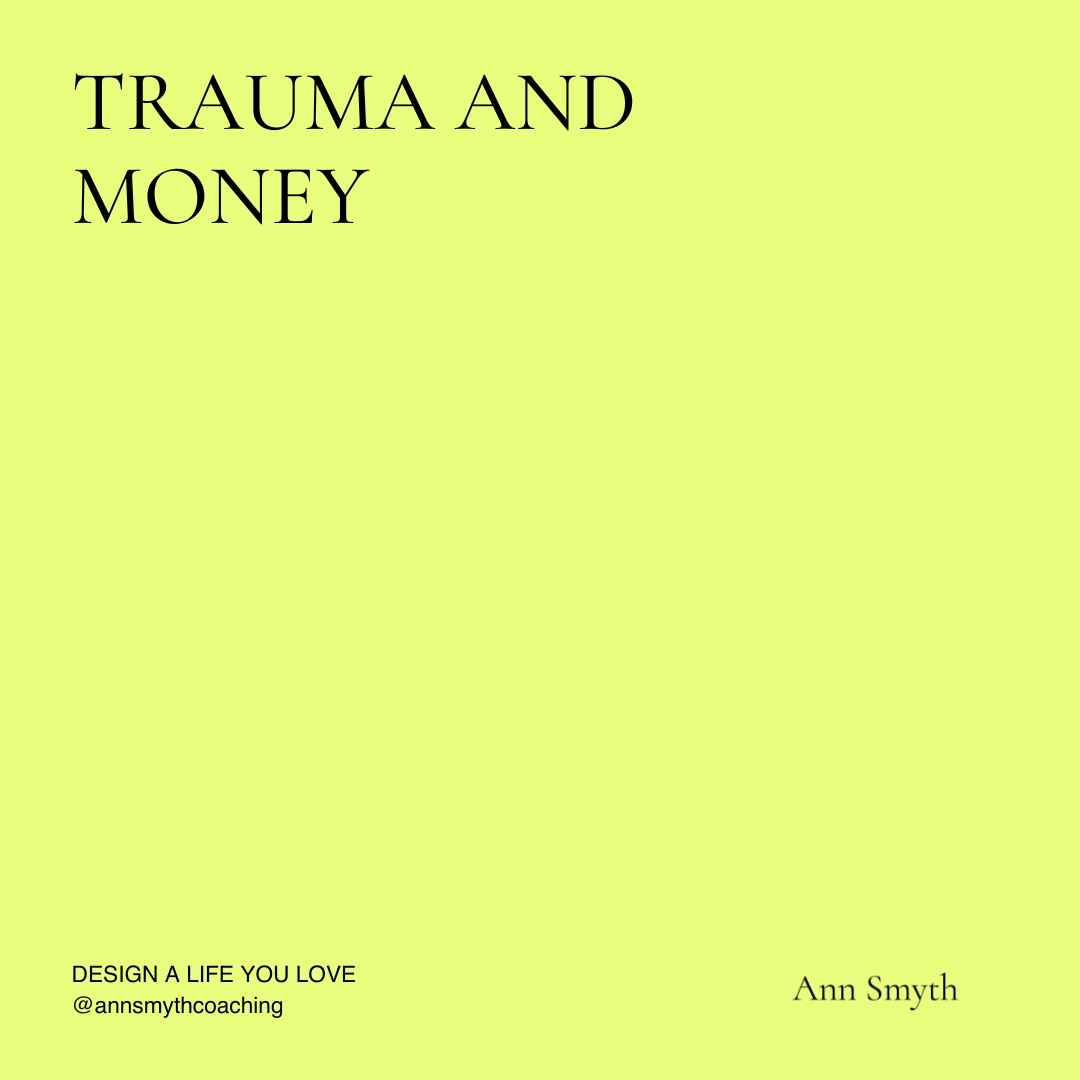Trauma and money
Trauma and the role it plays in your money mindset
Have you ever considered how trauma and scarcity are affecting your finances? This article covers all you need to know about these two topics and how they are linked.
What is trauma?
Trauma is an emotional and physiological response to something terrible which has happened to you and can be defined as Big T Trauma or little t trauma.
Big T Trauma is a very significant event such as being in a car crash, being sexually abused by another or experiencing the sudden death of someone. Naturally occurring events are also classified as Bit T trauma for example earthquakes, tornados or forest fires that result in significant damage or loss of life all cause a traumatic response in the body.
On the other hand, a small t traumatic event is something that you experience on a personal level, like the ending of a relationship you did not anticipate or being told over and over again that you are not good at something limiting your ability for growth in that area such as languages or sports.
Whichever type of experience you have, be it Big T or little t, what is happening to you emotionally, physiologically and spiritually is that your body holds onto the memory of that event as a consequence of having experienced that external traumatic event.
Or as Dr. Gabor Maté describes it - ´Trauma is not what happens to you, it's what happens inside you as a result of what happened to you´.
In essence this means that the trauma is not the event itself but your body´s memory of the event. It may therefore be possible for you to heal from and/or managing your emotional and physiological response going forward through the wisdom of your body aby learning how to understand its response to the traumatic event and change behaviours.
Introducing neuroception
Neuroception is a process your brain uses to decide if there is an immediate threat to your sense of safety. Your brain is constantly scanning your environment to assess the level of danger you are in at any time. Through your senses the brain analyses the information it is receiving and if needed it activates your nervous system into a fight, flight, freeze or fawn response to keep you safe.
How this works with traumatic events is that once you have experienced such an event your brain and nervous system keep a memory of this event and how it is perceived by your senses. When your senses are heightened in a similar way to that previous event your brain and nervous system will go straight to action mobilising you for safety through a fight, flight, freeze or fawn response.
For example, if you have experienced a bad biking accident due to a lack of traction under the wheels, when you find yourself in a similar situation, sitting on a bike in similar conditions, your brain and nervous system will assume you are in danger again. You may feel your heart rate speeding up and your breath becomes shallow or indeed you may not be able to even mount the bike.
Through neuroception your brain and nervous system is using its memory of a previously traumatic event and assuming a similar outcome will ensue based on their perception of how familiarly unsafe the circumstances feel.
In your professional career, this may play out where you experience micromanaging and bullying by one particular manager with distinct physical features so you decide to leave that company. In the new company you come across another manager who possesses the same physical features as the previous manager who caused you emotional distress. Through the process of neuroception, your brain and nervous system will very crudely perceive the environment as unsafe because of such familiarities, regardless of how differently this second manager acts.
And this is why the trauma is what is happening inside of rather than the external event.
Your ability to deal with the emotional, physiological and spiritual response your body is having by regulating your nervous system during the times it feels unsafe, will allow you to move beyond the event and go through your day in a way that feels safe and social.
Scarcity and trauma
When it comes to trauma responses in particular where they relate to money and finances it is important to look first at scarcity. Scarcity is the belief that there are not enough resources to meet the demand of life i.e. money, time, energy etc. This belief that there is not enough, can be perceived by our brains and nervous systems as a threat to our safety. Not being able to pay for food or shelter is a threat to your survival and as a result the concept of scarcity creates a traumatic response inside of your body.
In essence, scarcity affects people the same way a traumatic event does. Your nervous system becomes dysregulated and you are unable to function to the best of your ability. For this reason, it is important to look at your relationship with money and finances through a trauma informed lens.
What is a trauma-informed lens?
When scarcity and trauma are present, they impact your ability to be resilient. When you are seeking change in your life, in other words you desire to increase your resiliency and ability to adapt to change, it is important that you work with someone who approaches your goal through a trauma informed lens.
Looking at your experience through this lens means that your practitioner is aware that trauma (either Big T or little t) can exist for you and will work through this with you to guide and grow your resilience and solution-forward momentum in a way that is considerate and thoughtful.
Money, trauma and the nervous system
If resource scarcity (time, money, knowledge) is present in your life, your nervous system and brain will be experiencing a traumatic response to the situation. And when your nervous system is not feeling safe due to this traumatic response you can find yourself having a fight, flight, freeze or fawn response to your environment and circumstances.
A fight response for example when it comes to resource scarcity around money could look like overworking because of conditioned beliefs that the more you work, the more valuable you are and therefore you should earn more money.
A flight response in resource scarcity would be to avoid all discussions about finances and money. This can play out in your own personal finances, not checking bank accounts or even avoiding salary negotiations with management as it feels unsafe.
A freeze response is when you find yourself disengaging from reality and avoiding your financial commitments due to a lack of resources.
And finally, a fawn response, in terms of resource scarcity would be to people please thereby putting other people’s needs above your own because you don´t feel worthy enough to ask for more money or a salary increase.
Understanding how your nervous system responds to resource scarcity and implementing strategies, tools and techniques to move you from feeling dysregulation to regulation is the key to healing your relationship with money and finances.
When you take action without having expanded your nervous systems tolerance and resiliency for change you may create more traumatic responses in the future which could hamper your growth.
Whereas taking action from safety and connection to yourself and your body will significantly increase your tolerance and resiliency for change, creativity and adaptability when it comes to resource generation.
You can heal money and financial trauma
The good news with money and financial trauma is that it can be healed in a thoughtful and compassionate way. When you understand how scarcity of resources affects your specific nervous system you can then start the process of reprogramming and deconditioning your brain and nervous system for regulation rather than dysregulation.
Creating a sense of safety inside of your nervous system when it comes to your finances and relationship with money takes time and compassion. In terms of financial traumas, you may be carrying forward with you generational, systemic, racial or relational beliefs that impact your ability to regulate your nervous system.
Working with a trauma-informed Coach who is trained to help you identify these beliefs and the impact they are having on your nervous system will help you tremendously in healing your relationship with money and finances.
Ann Smyth is a trauma-informed Human Design Life Coach who is Certified in the Trauma of Money. If you would like to learn more about working with her, click here.





